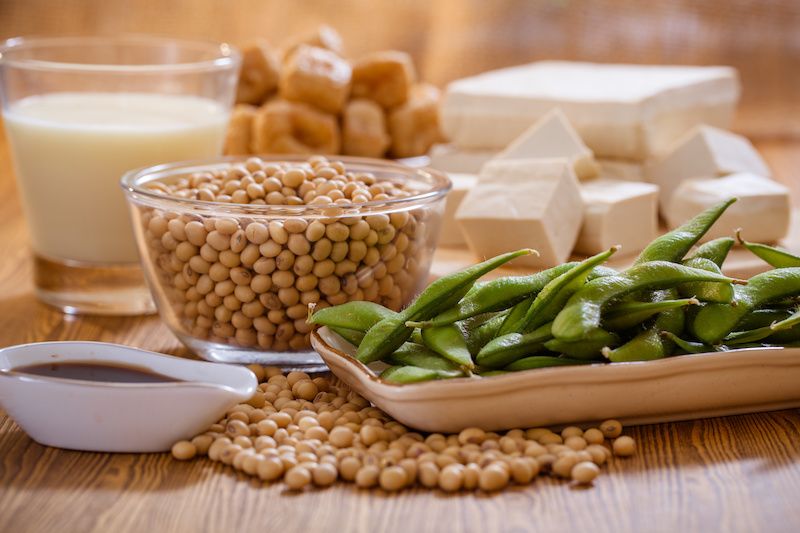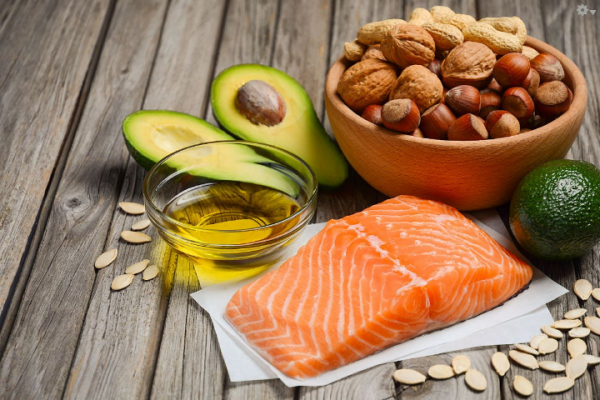Do soy foods increase your cancer risk? April marks National Soy Foods Month, so let's explore that question.
According to historical documents and archaeological finds, soybeans were first cultivated sometime in the 11th century BC in the eastern half of northern China, and soy has remained an important part of Asian diets ever since. Soy was first introduced to the United States in the mid-1700s. These days, soy sometimes gets a bad rap, but it can be part of a healthy pattern of eating.
Soy and cancer
A common misconception is that breast cancer patients and survivors — as well as those looking to prevent cancer — should avoid soy. However, current research shows that when it's eaten in moderation, soy is not only safe but may even be beneficial. Examples of one serving of a soy food include one-half cup of tofu, tempeh or edamame, or one cup of soy milk. When it comes to soy, “moderation” means about 1-3 servings of whole soy-based foods per day, or up to 100 milligrams of isoflavones. (One serving of a soy food typically contains about 25-35mg of isoflavones.)
Isoflavones are a group of phytoestrogens found in soy. Early studies in rodents suggested that some of these compounds increased the growth of estrogen-receptor-positive (ER+) breast cancer cells and promoted breast cancer growth. However, studies since then have shown that rodents and humans metabolize these compounds differently, and the same results would not be expected to occur in humans. The overall body of research shows that soy foods, eaten in moderation, do not increase the risk of cancer recurrence or early death, and may even be beneficial.
Furthermore, studies do not show any adverse interactions between soy foods and anti-estrogen medications. A small number of studies even suggest that soy foods may be protective for women who take tamoxifen or an aromatase inhibitor, but more research is needed. In addition, no studies have shown any harm to prostate cancer survivors who ate soy foods. Trials have also suggested that soy foods may reduce the risk of prostate cancer and may benefit prostate cancer survivors. Moderate soy consumption does not cause unwanted effects on hormone levels or physical characteristics.
Benefits of soy
Cancer survivors are encouraged to follow a plant-based style of eating — emphasizing fruits, vegetables, whole grains and legumes, and limiting intake of red and processed meats. Soy foods can be an important part of this eating pattern, which may help with weight management and cardiovascular health. Soy provides several key nutrients, such as protein, fiber and polyunsaturated fats (such as ALA omega-3s) as well as phytochemicals that may protect against cancer. While not naturally occurring in soy, calcium — which is needed for bone health — is often added to soy foods as well.
The protein in soy is called a “complete protein.” That means it provides all of the essential amino acids (the building blocks of protein) in the proportions that your body needs for health. The protein in soy is readily digestible and is optimal for muscle growth and repair, equivalent to animal proteins (meat, fish, poultry, eggs and dairy).
Ways to enjoy soy
- Tofu – The curd formed by adding certain salts to soy milk. Use firm or extra-firm tofu instead of meat for baking, grilling or sautéeing. Silken tofu is soft and a great substitute for dairy products in mousse, pie, pudding or even soup. For added flavor, try freezing marinated tofu before cooking.
- Edamame – Young, green soybeans. Try them sprinkled on a salad or as a snack, or make your own edamame hummus.
- Tempeh – Fermented soybeans. Tempeh must be cooked, unless it is pre-cooked and ready-to-use when purchased.
- Soy Dairy Alternatives – Include soy milk, soy yogurt, soy cheese, soy sour cream. Soy milk is comparable to cow’s milk in protein as well as vitamins and minerals. Choose unsweetened for less sugar.
- Soy Nuts – Roasted soy nuts make a tasty snack, and soy nut butter can be used as a direct substitute for peanut and other nut butters.
- Soy Burgers/Meat Substitutes – Quick to prepare and easy to keep on hand. Try soy crumbles as a substitute for ground beef in your favorite chili, spaghetti sauce or tacos.
More nutrition tips
Wondering what other foods you should eat after treatment? Explore more healthy eating tips & guidelines from our dietitians.



